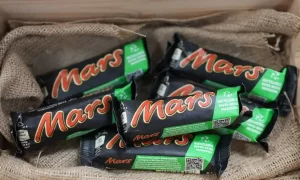
Mars bar wrappers changed to paper from plastic in UK trial
UK’s Mars Bar Wrappers Go Green: A Sustainable Shift from Plastic to Paper Packaging
Introduction:
In a groundbreaking move towards sustainability, Mars bar wrappers in the United Kingdom have undergone a significant transformation. The iconic chocolate brand has replaced its traditional plastic packaging with eco-friendly paper wrappers, marking a significant step forward in the fight against plastic pollution. This article delves into the details of this remarkable trial, highlighting the positive impact it could have on the environment and consumer behavior.
The Shift to Paper Packaging:
Mars, a global leader in the confectionery industry, has always been committed to reducing its environmental footprint. Recognizing the urgent need to address plastic waste, the company initiated a trial in the UK to test the feasibility of paper wrappers for its Mars bars. The trial aimed to assess the durability, functionality, and overall consumer acceptance of the new packaging.
Environmental Benefits:
The decision to switch from plastic to paper packaging brings forth a multitude of environmental benefits. Plastic pollution has become a global crisis, with single-use plastics clogging our oceans and harming marine life. By adopting paper wrappers, Mars is taking a significant step towards reducing its contribution to this crisis. Paper is a renewable resource that can be easily recycled, making it a more sustainable alternative to plastic. This shift will undoubtedly help in curbing the detrimental effects of plastic waste on our planet.
Consumer Response:
Consumer response to the trial has been overwhelmingly positive. People are increasingly conscious of the environmental impact of their choices and are actively seeking sustainable alternatives. Mars’ decision to embrace paper packaging aligns with this growing consumer sentiment, making the brand more appealing to environmentally conscious individuals. The trial has also sparked conversations about the importance of sustainable packaging, encouraging other companies to follow suit.
Challenges and Future Prospects:
While the transition to paper wrappers is undoubtedly a step in the right direction, it does come with its own set of challenges. Mars will need to ensure that the paper used for packaging is sourced responsibly, avoiding deforestation and promoting sustainable forestry practices. Additionally, the company will need to address concerns regarding the durability and shelf life of the paper wrappers to maintain the quality of its products.
Looking ahead, the success of this trial could pave the way for other confectionery brands to adopt sustainable packaging practices. It serves as a powerful example of how companies can make a positive impact on the environment while still meeting consumer demands. By embracing paper packaging, Mars is setting a precedent for the industry and inspiring others to prioritize sustainability.
Conclusion:
Mars’ decision to replace plastic wrappers with paper in its UK trial is a significant milestone in the battle against plastic pollution. This sustainable shift not only reduces the brand’s environmental impact but also resonates with consumers who are increasingly seeking eco-friendly options. As the trial progresses, it is hoped that Mars will overcome any challenges and set a new standard for sustainable packaging in the confectionery industry. The future looks promising, with the potential for other companies to follow suit and contribute to a greener, more sustainable world.
